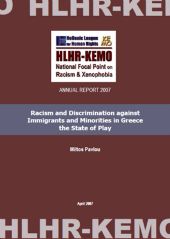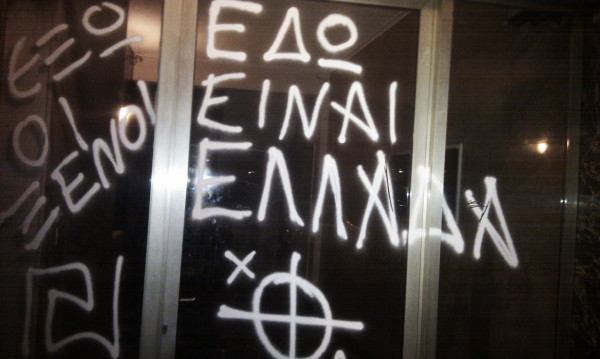I feel we need to do an expose on the long-held tradition of xenophobia and racism in Greece.
My blogging began because of a racist attack that had happened here in Greece six years earlier. It shocked the country then, not just because it was so horrific but also because the country had to wake up and see that racism exists here, contrary to popular opinion.
It is a commonly held belief that Greeks are not racist. It is also common to hear people say, “We don’t mind Black people, it’s the Albanians, Turks or Gypsies, we have a problem with. In more recent times, the Chinese have joined the list of baddies because of the small shops selling cheap clothing that have sprung up all over the big cities. This is a country where it is still acceptable to put your house up to rent and to specify that foreigners need not apply. This is a place where the media will accuse any crime on Albanians before any facts are known. There is no shortage of stories here about racism and xenophobia. There is more material than I could possibly cover myself.
I understand that It is often difficult for people to face up to racism. It is not an enjoyable experience to be accused of racism. And here I was accusing a whole country of the racism they didn’t want to see or acknowledge. There has been a collective temper tantrum and an avalanche of denial. How dare a foreigner call us racist? And worse still, a black one!
The problem is that you cannot tackle racism unless there is an admission of its existence and a willingness to accept responsibility and to change it. It is pointless to say that the racism in England or France is worse than here. That is not helpful to the Roma or Albanian (or other foreign) people who are beaten up on a regular basis by the police. That doesn’t help the asylum seekers who are locked up and treated worse than animals. That doesn’t assist the hundreds of African children who cannot get birth certificates issued when they are born here leading to problems getting health care, education or a passport.
There are many Greek bloggers who are tackling the same issues that I am. There are hundreds of people here who are working for change. Unfortunately, the mainstream media seems to have its head buried firmly in the sand. And the politicians are mainly just being politicians. They do absolutely nothing at best. The nationalist party is gaining ground, with its leader being seen regularly on TV, spouting his racist garbage. There are reasons that this is happening. The hysteria about the rising numbers of immigrants here (now at around 10% of the population) that is fueled by the media. There are the usual accusations that the nationals are losing their jobs because of foreigners. The rising crime figures are blamed on us regardless of information that this is not true. And on and on and on…
The main problem I see is that we are now seeing second and third generation of “foreigners” who are not immigrants. They are Greek and they are growing up and they are demanding equality and opportunity. Unless Greece as a country can grow up and acknowledge that there is a problem of racism, I can see only trouble ahead. You only have to look at what has happened in other countries to see the result of ignoring, ghettoizing and generally abusing those who are “other” Lessons can be learned from the experiences of other countries if only there was a willingness to do so. I do not see that happening here. It seems to me that we are on a well-trodden path to more serious problems in the very near future. People can only be poked for so long and then they bite back.
We will hear more angry protests about the treatment of foreigners and Greeks of different backgrounds. We will see people taking to the streets (a common pastime here for any grievance) demanding their rights as citizens of this country. We will see support for the struggle here from people outside the country. More international condemnation of the abuses that occur here. Whether the powers that be will sit up and take notice and then have the guts to actually do something about it, remains to be seen.
I feel compelled to keep scratching away at this issue regardless of what I am being accused of (from trying to undermine the country, to being a terrorist, to the classic “you’re the racist”). I have seen small shifts even on my humble blog and have many Greek blog friends who support this effort. The outpouring of support when the nationalists targeted me was incredible. Perhaps the change can come from us, the little people who care about big things and are letting the world know what is happening.
http://www.feministe.us/blog/archive...sm-and-greece/
It is a commonly held belief that Greeks are not racist. It is also common to hear people say, “We don’t mind Black people, it’s the Albanians, Turks or Gypsies, we have a problem with. In more recent times, the Chinese have joined the list of baddies because of the small shops selling cheap clothing that have sprung up all over the big cities. This is a country where it is still acceptable to put your house up to rent and to specify that foreigners need not apply. This is a place where the media will accuse any crime on Albanians before any facts are known. There is no shortage of stories here about racism and xenophobia. There is more material than I could possibly cover myself.
I understand that It is often difficult for people to face up to racism. It is not an enjoyable experience to be accused of racism. And here I was accusing a whole country of the racism they didn’t want to see or acknowledge. There has been a collective temper tantrum and an avalanche of denial. How dare a foreigner call us racist? And worse still, a black one!
The problem is that you cannot tackle racism unless there is an admission of its existence and a willingness to accept responsibility and to change it. It is pointless to say that the racism in England or France is worse than here. That is not helpful to the Roma or Albanian (or other foreign) people who are beaten up on a regular basis by the police. That doesn’t help the asylum seekers who are locked up and treated worse than animals. That doesn’t assist the hundreds of African children who cannot get birth certificates issued when they are born here leading to problems getting health care, education or a passport.
There are many Greek bloggers who are tackling the same issues that I am. There are hundreds of people here who are working for change. Unfortunately, the mainstream media seems to have its head buried firmly in the sand. And the politicians are mainly just being politicians. They do absolutely nothing at best. The nationalist party is gaining ground, with its leader being seen regularly on TV, spouting his racist garbage. There are reasons that this is happening. The hysteria about the rising numbers of immigrants here (now at around 10% of the population) that is fueled by the media. There are the usual accusations that the nationals are losing their jobs because of foreigners. The rising crime figures are blamed on us regardless of information that this is not true. And on and on and on…
The main problem I see is that we are now seeing second and third generation of “foreigners” who are not immigrants. They are Greek and they are growing up and they are demanding equality and opportunity. Unless Greece as a country can grow up and acknowledge that there is a problem of racism, I can see only trouble ahead. You only have to look at what has happened in other countries to see the result of ignoring, ghettoizing and generally abusing those who are “other” Lessons can be learned from the experiences of other countries if only there was a willingness to do so. I do not see that happening here. It seems to me that we are on a well-trodden path to more serious problems in the very near future. People can only be poked for so long and then they bite back.
We will hear more angry protests about the treatment of foreigners and Greeks of different backgrounds. We will see people taking to the streets (a common pastime here for any grievance) demanding their rights as citizens of this country. We will see support for the struggle here from people outside the country. More international condemnation of the abuses that occur here. Whether the powers that be will sit up and take notice and then have the guts to actually do something about it, remains to be seen.
I feel compelled to keep scratching away at this issue regardless of what I am being accused of (from trying to undermine the country, to being a terrorist, to the classic “you’re the racist”). I have seen small shifts even on my humble blog and have many Greek blog friends who support this effort. The outpouring of support when the nationalists targeted me was incredible. Perhaps the change can come from us, the little people who care about big things and are letting the world know what is happening.
http://www.feministe.us/blog/archive...sm-and-greece/






Comment